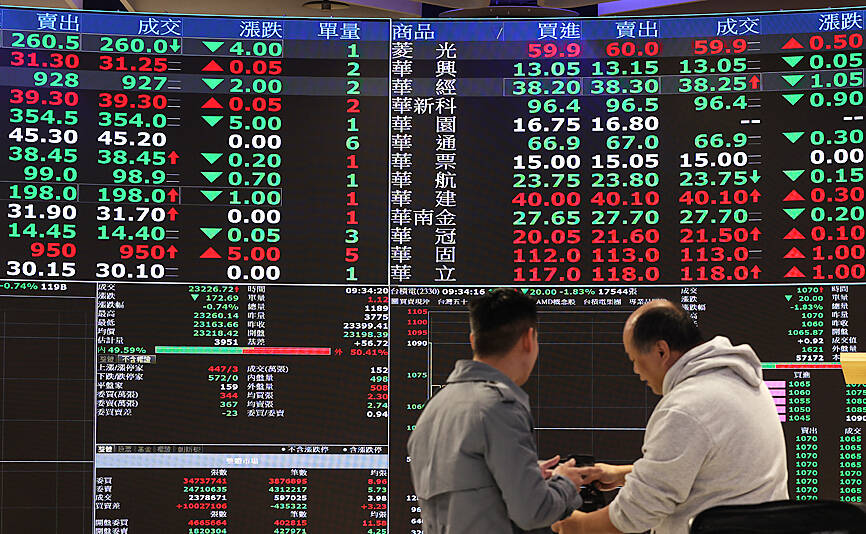Shares closed lower yesterday, but recouped part of earlier losses as sentiment remained cautious in the wake of volatility on Wall Street overnight after US President Donald Trump confirmed tariffs on imports from Canada, Mexico and China would go into effect later in the day as planned.
Most Asian markets fell in volatile trade on fears of a trade war after China announced levies of 10 and 15 percent on a range of US agricultural imports in retaliation for Trump’s tariffs and Canada said it would respond in kind, with 25 percent tariffs on US$155 billion of US goods.
The TAIEX closed down 159.37 points, or 0.7 percent, at 22,596.88, with a turnover of NT$400.207 billion (US$12.16 billion), Taiwan Stock Exchange data showed.

Photo: CNA
The index had dropped by almost 400 points at one point before some bargain hunters emerged to pick up select electronics heavyweights to help the broader market recover some of its earlier losses by the end of the session, Cathay Futures Consultant Co (國泰證期) analyst Tsai Ming-han (蔡明翰) said.
“After the recent downturn, bargain hunters appeared active for the moment, setting their sights on large-cap tech stocks which had been hit hard by tariff concerns,” Tsai said.
Elsewhere in Asia, Tokyo’s Nikkei 225 dropped 1.2 percent to 37,331.18, the Hang Seng Index in Hong Kong lost 0.4 percent to 22,922.16, while the Shanghai Composite edged 0.2 percent higher to 3,324.21.
South Korea’s KOSPI gave up 0.2 percent to 2,528.92 and Bangkok’s SET lost 1.1 percent. Shares in Singapore, Sydney, Wellington, Jakarta and Kuala Lumpur were also down.
Concerns over the impact of a full-blown tariff war spread to European markets, with London, Paris and Frankfurt, Germany, all opening lower.
“The specter of a full-blown trade war is once again looming, threatening to choke global economic growth just as investors were starting to regain confidence,” SPI Asset Management managing partner Stephen Innes said.
Investors are hoping that China would announce a huge economic stimulus package at its key parliamentary meeting, the Chinese National People’s Congress, which opens today.
“In the upcoming National People’s Congress, Chinese policymakers could provide more pro-growth measures, including announcing a larger budget deficit target and maintaining a 5 percent growth target for this year,” Mitsubishi UFJ Financial Group Inc analyst Lloyd Chan said.
For now, markets no longer think Trump is full of bluster and are moving quickly to anticipate a slowdown in US and global growth, as trade conflict has begun in earnest and the US dollar is falling while bond yields dive.
“It is difficult for markets to get on with aggressive positioning given the risk of US tariff policies turning on a dime,” DBS Bank Ltd currency and credit strategist Chang Wei Liang (張偉亮) said. “In credit markets, spreads certainly look too low given the change in risk environment and a more adverse and uncertain trade backdrop.”
Volatility gauges for Treasuries and for US and Japanese stocks hit their highest levels of the year this week and implied volatility in currencies ticked higher.

In Italy’s storied gold-making hubs, jewelers are reworking their designs to trim gold content as they race to blunt the effect of record prices and appeal to shoppers watching their budgets. Gold prices hit a record high on Thursday, surging near US$5,600 an ounce, more than double a year ago as geopolitical concerns and jitters over trade pushed investors toward the safe-haven asset. The rally is putting undue pressure on small artisans as they face mounting demands from customers, including international brands, to produce cheaper items, from signature pieces to wedding rings, according to interviews with four independent jewelers in Italy’s main

Japanese Prime Minister Sanae Takaichi has talked up the benefits of a weaker yen in a campaign speech, adopting a tone at odds with her finance ministry, which has refused to rule out any options to counter excessive foreign exchange volatility. Takaichi later softened her stance, saying she did not have a preference for the yen’s direction. “People say the weak yen is bad right now, but for export industries, it’s a major opportunity,” Takaichi said on Saturday at a rally for Liberal Democratic Party candidate Daishiro Yamagiwa in Kanagawa Prefecture ahead of a snap election on Sunday. “Whether it’s selling food or

CONCERNS: Tech companies investing in AI businesses that purchase their products have raised questions among investors that they are artificially propping up demand Nvidia Corp chief executive officer Jensen Huang (黃仁勳) on Saturday said that the company would be participating in OpenAI’s latest funding round, describing it as potentially “the largest investment we’ve ever made.” “We will invest a great deal of money,” Huang told reporters while visiting Taipei. “I believe in OpenAI. The work that they do is incredible. They’re one of the most consequential companies of our time.” Huang did not say exactly how much Nvidia might contribute, but described the investment as “huge.” “Let Sam announce how much he’s going to raise — it’s for him to decide,” Huang said, referring to OpenAI

The global server market is expected to grow 12.8 percent annually this year, with artificial intelligence (AI) servers projected to account for 16.5 percent, driven by continued investment in AI infrastructure by major cloud service providers (CSPs), market researcher TrendForce Corp (集邦科技) said yesterday. Global AI server shipments this year are expected to increase 28 percent year-on-year to more than 2.7 million units, driven by sustained demand from CSPs and government sovereign cloud projects, TrendForce analyst Frank Kung (龔明德) told the Taipei Times. Demand for GPU-based AI servers, including Nvidia Corp’s GB and Vera Rubin rack systems, is expected to remain high,